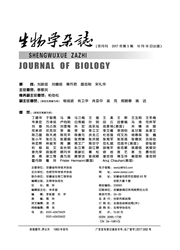

 中文摘要:
中文摘要:
大卫鼠耳蝠(Myotis davidii)为中国特有蝙蝠物种.选用8个微卫星位点,研究并评价了大卫鼠耳蝠种群数量、遗传多样性与其栖息洞穴干扰的关系.结果表明,各微卫星位点遵循HW平衡.在124个个体的8个微卫星位点中共检测到130个等位基因.平均NA、He和Ho 分别为16.25、0.71和0.62.单位洞穴长度内大卫鼠耳蝠个体数量和等位基因丰富度随干扰强度增加呈现降低趋势.洞穴单位长度内个体数量则受湿度、干扰强度的显著影响.等位基因丰富度不受个体数量的影响,而受洞穴大小和干扰强度的显著影响.通过对大卫鼠耳蝠栖息洞穴的综合评价,82.35%的栖息洞穴已受到人类活动的影响.此外,种群瓶颈效应事件的出现和洞穴微环境的改变,将进一步影响大卫鼠耳蝠种群及其遗传多样性.因此,建议政府部门及当地群众要尽量缩减对其栖息洞穴的开发规划,减少人为干扰,加强就地保护以有效维持其种群良性发展.
 英文摘要:
英文摘要:
David myotis' bat (Myotis davidii) is an endemic bat species of China. 8 microsatellite loci were used to study and evaluate the relationship between population, genetic diversity and the habitat cave interference. The results showed that the microsatellite loci followed the HW equilibrium. 130 alleles in 8 microsatellite locus of 124 individuals were detected. The average NA, He and Ho were 16. 25, 0. 71 and 0. 62, respectively. The individual numbers in unit cave length and the allelic richness were all decreased with the disturbance intensity increased. The individual numbers in unit cave length were significantly affected by the humidity and the disturb- ance intensity. Allelic richness was not affected by the individual numbers, but significantly affected by the cave size and the disturb- ance intensity. On comprehensive evaluation, the caves inhabited by David myotis'bats, there was 82. 35% caves affected by human activity. In addition, the population bottleneck effect events and the changed of the cave micro-environmental were further affected the David myotis'bat population and its genetic diversity level.
 同期刊论文项目
同期刊论文项目
 同项目期刊论文
同项目期刊论文
 期刊信息
期刊信息
